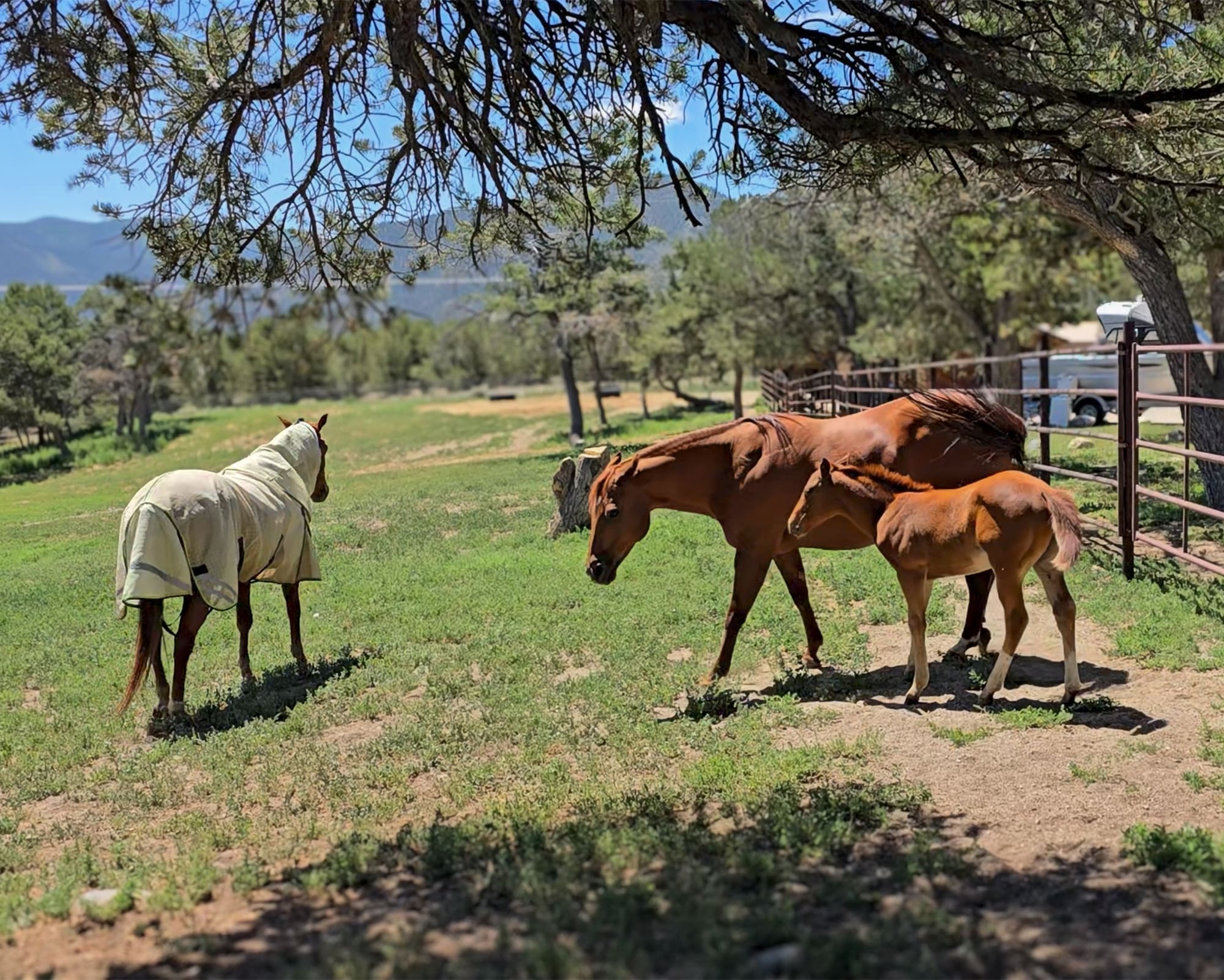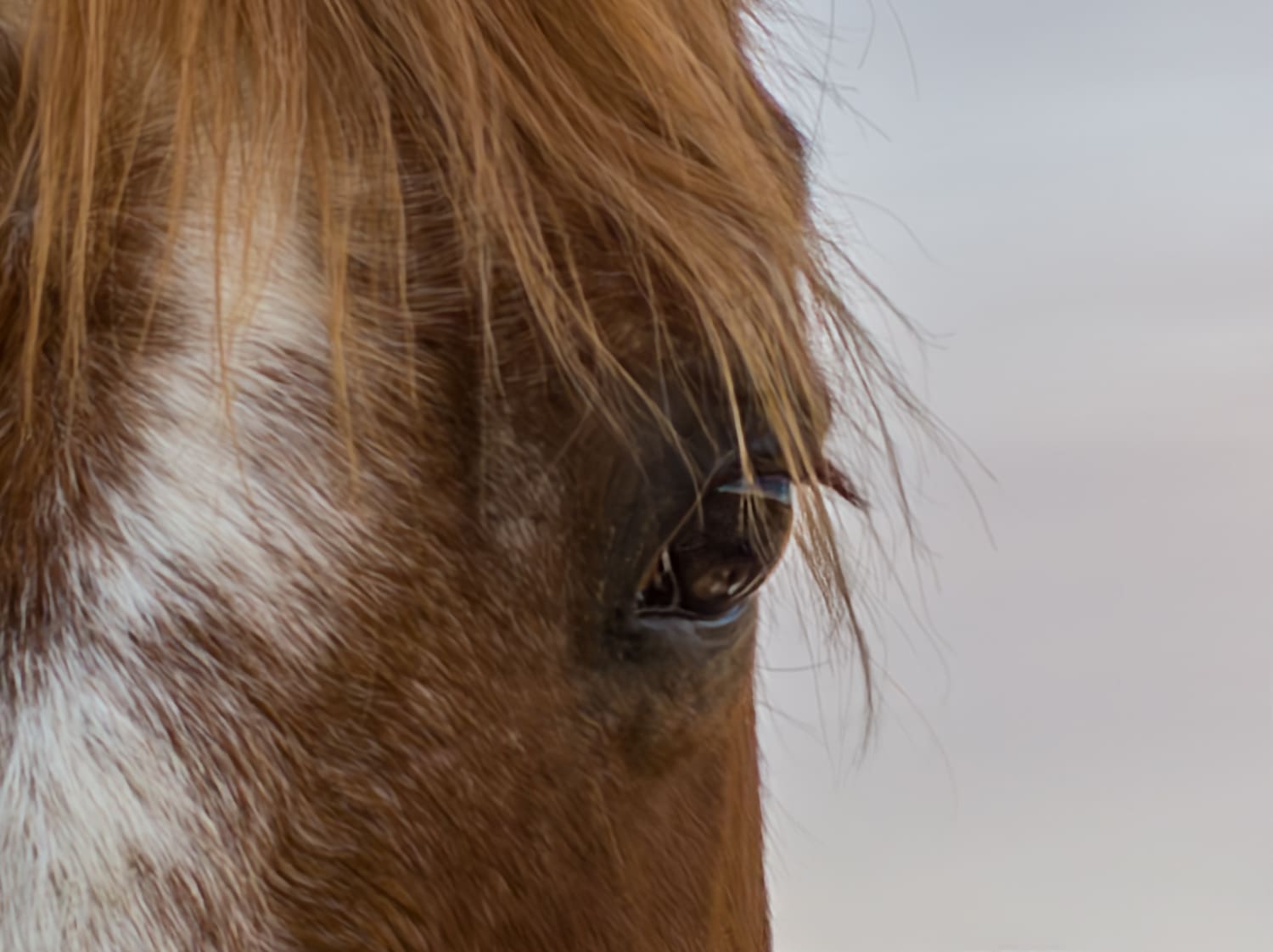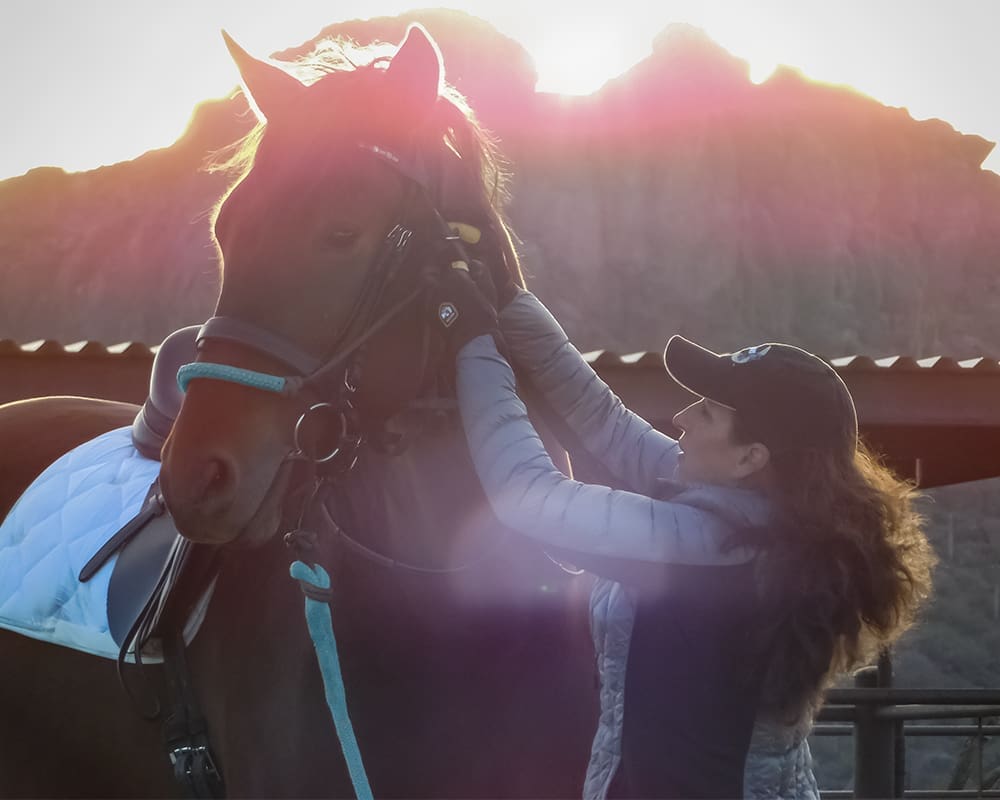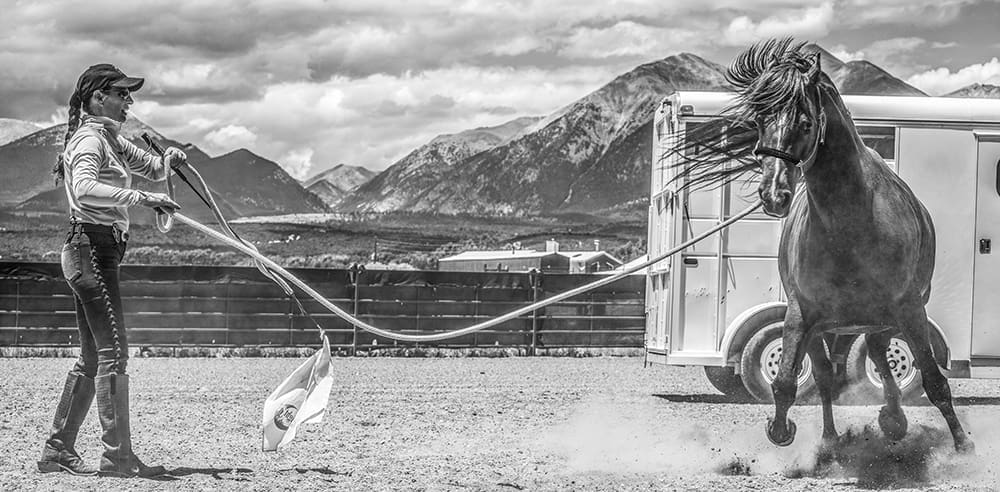By Julie Goodnight
Have you worked with a rescued horse or a horse with abuse in his past? The lessons learned from working with these troubled-but-not-disposable horses are priceless. If you let them, these horses can help us understand horse and human behavior
Like humans, horses can carry some heavy emotional and physical pain “baggage’ from their pasts. As horse handlers, we may or may not get to know about that past pain. The burden of this past-trauma (real or imagined) has a tendency to surface unexpectedly and may spiral out of control quickly. The best we can do is help the horse feel safe, try to comfort him as best we can and direct his energy in a more positive direction–in the hopes that his mind will calm and he’ll be able to think his way back to some sense of normalcy.
At a recent clinic, I met a horse who reminded me what it’s like to feel out of control—and he taught me what can be done to create a place of calmness where learning can occur.
It started like any other clinic, with about 15 horses and their handlers meandering into the large arena, each equipped only with halter and lead. As usual, most of the horses were looking around, assessing the situation showing mild to moderate interest in the other horses, but hanging tight with their human. Some horses gave the distinct impression that they were thinking, as they looked my way, sizing me up (all 5’4” of me, mic’d up, talking 100 words a minute and pacing a rut in the middle of the pen). “Uh oh, looks like we’re at another horsemanship clinic; do nothing to draw attention to myself and conserve all energy, because I think I might be here all day!”
Other horses were too busy looking at all the unknown horses and cycling through a range of emotions from excitement, to flirtatious, to intimidating, to cocky and strutting like a peacock. Some horses had the appearance of a well-heeled dog–keeping one keen eye on their handler so as not to miss any cues or expectations. At the same time, these horses took in as much information as possible from the other horses and the unfamiliar environment. A few of the older, seasoned horses stood quietly, half asleep and giving the occasional stink eye to the ‘uncivilized’ horses.
But one horse was very distressed. He was a mess: Pawing, stomping and head butting his handler, screaming at the top of his lungs, tossing his nose in the air and hurling himself to the right and then to the left, bouncing off the end of the lead when he hit it. The handler was doing an admirable job of hanging onto the end of the lead with a few strides of dirt skiing here and there. Looking at the horse’s face as he called out, I could see deep lines of fear-sweat around the eyes–in spite of the cool morning temps in the mountain air. The whites of his eyes were visible much of the time and occasionally his eyes gave the appearance of rolling back in its head. This horse was desperately trying to send a message. “I do not want to be here. In fact, I would rather be ANY WHERE ELSE ON EARTH than here or with you!”
As I got the rest of the horses and handlers moving about the arena in an orderly fashion, I asked the woman with the troubled horse to tell me about him. “I have no idea what’s wrong with him! He’s not normally like this at home,” she cringed in embarrassment, like a mother whose kid just threw a wall-eyed fit in a restaurant.
“How many times have you taken him to a strange place to ride him?”
“Well never, really,” she started. “You see, I’ve only had him for a few months and this is our first attempt at a road trip. He came from a rescue, so I don’t really know much about his history, but I think he was abused.
“When I ride at home with my husband, he’s perfectly calm and does everything I ask,” she said with exasperation. “This is the first time I’ve tried anything like this and we thought it’d be better to leave my husband’s horse at home, so we could get some confidence on our own.”
One thing was very clear to me, this horse was stressed out way beyond the point of thinking and his owner was certainly not getting any more confident. She looked like she’d be happy to tuck her tail and run out the arena gate–gladly forfeiting the tuition and chalking the whole thing up to lessons-learned if I gave her even the slightest opening. Meanwhile, the horse was reaching back into his most basic survival instincts. He forgot everything he knew about his training and was getting more angry and frustrated by the minute. He cried out for help in every way he knew how.
Creating Calm
No horse is happy in this state and no horse wants to feel this way—it’s just the only way they know how to feel. They don’t know how to get rid of that bad feeling except to fight or flee. I feel like it’s my job as a horsemanship clinician, to give the horse (and human) what he needs in the moment to feel safe and comfortable. Because only when his mind is calm and relaxed, is he capable of learning and growing. Without question, the same can be said of humans too—when the mind is in a state of stress and turmoil, it’s hard to get much clear thinking done.
Before the horse owner could get any closer to the exit gate, I asked her if I could take her horse for a few minutes to see if I could help him. It only took 10-15 minutes of guiding his energy, telling him where to go, how fast to get there and how to act in the process. I provided him with structure, guidance and praise–making all the decisions for him so he didn’t have to think, until he began to soften.
As the horse began to understand the very simple things I was asking and the clear and quiet directives I was giving, things made sense to him again. He could trust me and realized that it might benefit him to listen to what I had to say—especially since leaving was not an offered option. Once his focus came onto me, I stopped him to let him rest and turned my back to take away all the pressure. It wasn’t long before he exhaled deeply, lowered his head and rested his very busy mind and body. Soon he was licking his lips and dropping his head as his eyelids went to half-mast.
Horses are emotional animals, perhaps more emotional than even humans. Maybe it’s because of their sheer size or because of their exceptional capabilities when it comes to fight or flight. But when a horse has reached his limit and his emotions boil over, it can be a scary and daunting challenge for us humans. In fact, most of us would be so uncomfortable around a horse like that, we would want to look the other way or shun the horse as bad. It’s far easier, and sometimes safer to get rid of the emotionally troubled horse than it is to be empathetic and to work through the problem to help him feel safe and find some peace. But there was good in this horse, he didn’t need to be ignored or shunned.
This horse needed to be understood. He needed kindness, patience and a release of pressure.
The Horse-Human Connection
Horses and humans can both feel this sense of “out of control.” I’ve learned from personal experience that when people are in turmoil–mentally or emotionally–they are in a very lonely and desperate place and what they need most in that moment is kindness, patience and a release of pressure.
I understood this next concept with horses long before I came to understand people are the same way—when they are struggling with depression, anxiety, post-traumatic stress or any number of mental health issues. It’s far easier to cross the street to get away from that angry/frustrated/volatile being than it is to look him in the eye and ask sincerely how you can help.
Because horses and humans share this common emotional connection, it comes as no surprise that horses can help humans who are struggling with mental health issues of any kind. Horses are especially good at helping those who feel stress and fear. No human is more empathic than a horse when it comes to understanding your fears and no human is more honest in reacting to your own emotions than a horse. That’s why the therapeutic value of horses is so high.
Horses have survived in our society for thousands of years—long after their usefulness in “paving civilization,” they have adapted and survived and made themselves valuable to us in so many different ways–from sport to entertainment to therapy. Today, perhaps one of the greatest gifts we get from horses is the mental health benefit that we –all riders and handlers get. Whether an autistic child, a wounded warrior, an abused spouse, a person with a physical handicap, or a person struggling to control their emotions, there is help with horses. They understand.
Horses make me a better person—they teach me patience, emotional control, clear communication skills. And they make me look within myself a lot—even when it is not comfortable to do so.
Horses have a unique way of giving us exactly what we need in the moment to find our place, to quiet our minds, to rise to a challenge and to be a better person. Just like the horse in my clinic, horses are beautiful teachers. They are survivors; and if we pay close attention and understand what they need, they can help us all to survive in this often-crazy world.



